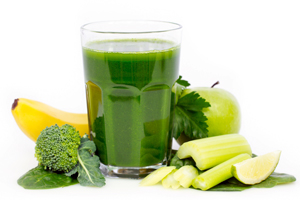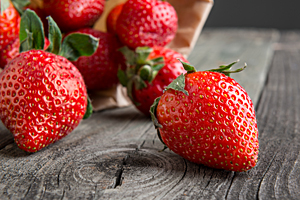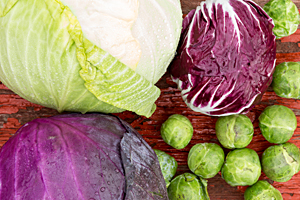
While Kale is the current superhero of the veggie world, offering a myriad of health benefits, did you know that it could potentially have a negative impact on your thyroid? How can that be, you might ask?
We read that Gwyneth Paltrow and Jennifer Aniston devour it; Kevin Bacon recently declared we’re in “the age of kale.” Bette Midler recently tweeted, “Kale is burning up the veggisphere … Never saw a veg go from wretched to wonderful so fast.” Virtually every restaurant now offers a kale salad or other side dish with this media darling of the veggie world in it. We’re even encouraged to throw kale into soups and our home-made juices.
So back to the kale and thyroid connection… Our thyroid is responsible for storing and producing hormones that affect EVERY organ in our bodies. The T3 hormone regulates our metabolic rate and affects even changes in our energy levels and body weight.
Kale belongs to the family of cruciferous vegetables that include: spinach, broccoli, cauliflower, collard greens, cabbage and Brussels sprouts. In each of these vegetables, “a substance called thiocyanate, which in high concentrations, can interfere with adequate iodine nutrition” according to Dr. Leung, MD, an Endocrinologist and Clinical Assistant Professor of Medicine at UCLA and Chair of the Public Health Committee at the American Thyroid Association.
She adds that “the thyroid needs iodine to produce thyroid hormone and thus exposure to very high amounts of thiocyanate can potentially result in an underactive thyroid.” Now the key in all of this is the quantity in which these vegetables are being consumed. The average person, who doesn’t have a thyroid condition, could likely consume a significant quantity of cruciferous vegetables on a daily basis for some time, without seeing any significant negative effects.
However, for a person who has an underactive thyroid and has embarked on a detoxing 21- day juice cleanse that includes significant quantities of Kale, this could present a potential health concern. Dr. Leung notes “juicing is the real culprit, as it concentrates the vegetables and thus potentially poses a greater risk toward iodine deficiency and hypothyroidism if ingested in large amounts on a frequent basis.” This answered several of my questions last year after becoming more curious about kale and it’s health benefits.

Juicing is a great way to get “your vegetables,” but it does tend to concentrate both the health upsides and possible downsides of the vegetables you are using.
I started juicing daily, about 10 years ago, after my cancer diagnosis. Each morning I would toss a large handful of spinach along with celery, carrots, red peppers and cucumbers into the juicer. I loved knowing that I was starting my day with a good grouping of veggies in the morning. Over time, I noticed that I just didn’t have much energy, even with my usual protein breakfast. I was on a thyroid medication that didn’t seem to be working effectively, so my doctor would increase the dosage periodically. I still juice, but not as frequently as I once did. I’ve found that when I take a break for a few days, I can still enjoy kale and spinach and I don’t feel the lethargy as much. I also learned that juicing these vegetables outside of four hours of taking my thyroid medication wouldn’t impact my thyroid as much. (I usually take my thyroid meds first thing in the morning.)
And speaking of juicing, I remember last summer my son was doing a 21-day juice cleanse. The daily ingredients included kale. He was on a controlled cleanse, working with a qualified nutritionist, however he noted that he felt very fatigued. I also happen to know that he has an under-functioning thyroid (hypothyroidism).
In my continued research I found that kale by itself doesn’t increase the possibility of thyroid problems. Another contributing factor may be iodine deficiency. We’ve all become so much more aware of our salt intake that it wouldn’t be surprising to find out that some of you out there might be iodine deficient. By embracing the delicious kale culture, and having a genetic link to thyroid issues (or already taking thyroid medication for under active thyroid), you could unknowingly be derailing all those good intentions to be eating nutritiously.

A veggie / fruits smoothie is a great addition to a healthy diet, but some ingredients need to be used in moderation.
The health benefits of kale are truly astounding. If consumed in moderation and after consulting your doctor to rule out a possible thyroid issue, kale is a super green food with lots of antioxidants that can protect us against cancer. It’s full of Vitamin C, fiber and iron, which gives us good energy and supports our blood. In addition, it’s great for our bones because it’s loaded with calcium.
While all of the studies aren’t in, others have confirmed the kale-thyroid link. There is also speculation that eating large amounts of cruciferous vegetables could also result in an enlarged thyroid, otherwise known as a goiter.
Other sources have made these recommendations regarding the consumption of kale and the other cruciferous vegetables:
- Try to buy them organically when you can.
- While some people love them raw and as part of a juicing regimen, lightly cooking these vegetables can be easier on the digestive tract and can actually help with minimizing thyroid interference. (Prevention Magazine)
- Mix it up! There are other nutritional greens out there, so try cruciferous one day and non-cruciferous on others. Your body will thank you for the variety!
- Try to avoid eating cruciferous vegetables within four hours of taking thyroid medication to reduce potential drug / diet interference. (San Francisco Gate-Healthy Eating)
- A few Brazil nuts each day add selenium to your diet, which support normal iodine levels.
- Other foods to avoid in large quantities that can negatively affect the thyroid include: flax, almonds, strawberries, soy, peaches, peanuts, corn, radishes and rutabagas.

Strawberries, soy, peaches, and peanuts are among a number of foods that are best eaten in moderation to prevent untended health consequences.
I love making the connections between what goes in my body and then how my body reacts. This posting is not meant to scare you, rather to educate and make us all more aware. Kale is part of a very beneficial food group that offers many health benefits.
Once again, I am reminded that even the healthiest foods are best when eaten organically and in moderation. It’s so easy to find healthy foods that we become infatuated with, and then… overindulge. Even eating too much chocolate isn’t good. (Been there, done that, too!)
Peace and Good Health!
Additional Sources:
Oregon State University Micronutrient Information
Teresa Fung, Harvard School of Public Health
Prevention Magazine
New York Times-“The Dark Side of Kale”
San Francisco Gate-Healthy Eating
JAN

